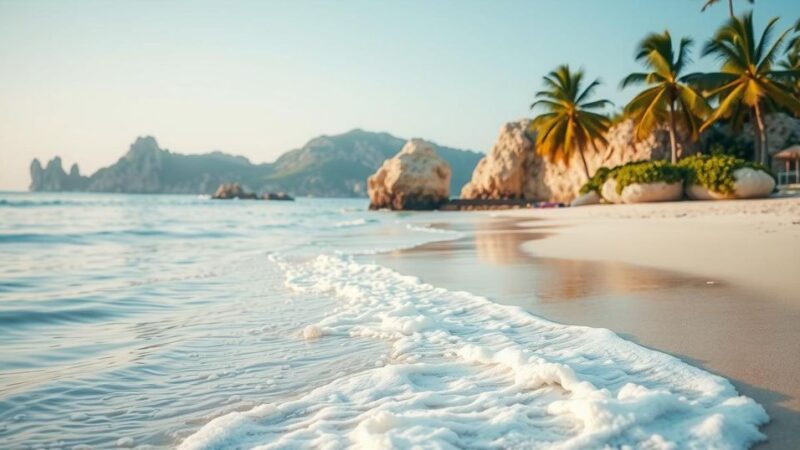President Mohamed Muizzu of the Maldives is visiting India to negotiate a financial bailout as the nation faces an economic crisis marked by dwindling foreign reserves and rising default risks. The visit is significant as it reflects the Maldives’ reliance on India for support and the need to repair strained bilateral relations following Muizzu’s earlier ‘India out’ policy. Experts express that the key objectives of this visit may include financial aid and a currency swap to stabilize the economy, which has suffered impacts from poor diplomatic exchanges, particularly in Indian tourism.
President Mohamed Muizzu of the Maldives is embarking on a critical visit to India this week, with the aim of negotiating a financial bailout amidst an alarming economic crisis characterized by looming debt default. This represents his first official bilateral engagement since assuming office following a campaign heavily focused on an ‘India out’ policy aimed at diminishing New Delhi’s influence over Maldivian affairs. The Maldives finds itself in a precarious situation, with foreign exchange reserves dwindling to approximately $440 million—sufficient for merely one and a half months of imports. The recent downgrade of the Maldives’ credit rating by Moody’s highlights the rising default risks the nation faces. An agreement with India for financial assistance is thought to be an essential consideration during Muizzu’s discussions, aimed at reinforcing the nation’s foreign currency reserves. Prior to his engagement with India, Muizzu sought to strengthen ties with Turkey and China, actions regarded as snubs towards India given that previous Maldivian leaders traditionally prioritized visits to New Delhi. The visit is seen by some analysts as a pivotal moment acknowledging the Maldives’ significant reliance on India for food, infrastructure, and healthcare. The current financial landscape is dire, with the Maldives holding a public debt estimated at $8 billion, including notable obligations to both China and India. Despite Muizzu’s statements suggesting a deferral of debt payments from China, tangible financial support from Beijing has yet to materialize. Therefore, engaging in dialogue with India serves dual purposes—mending strained relations and securing vital financial assistance. This visit occurs against a backdrop of heightened tensions and controversial remarks from Muizzu’s administration towards Indian officials, which had negatively impacted tourism—one of the Maldives’ crucial economic sectors. It is imperative for Muizzu to reset the diplomatic tone with India, as the decline in Indian tourist attendance has translated to significant losses, potentially exacerbating the nation’s financial plight.
The Maldives, an archipelago nation consisting of approximately 1,200 coral islands located in the Indian Ocean, has historically maintained a symbiotic relationship with India, especially considering its geographical proximity and strategic significance. The Maldives has a population of roughly 520,000, compared to India’s substantial 1.4 billion. The recent elections resulted in the rise of President Mohamed Muizzu, who campaigned on a platform designed to reduce Indian influence over Maldivian politics, led to tense bilateral relations. The economic backdrop is stark, with foreign reserves falling critically low and the risk of default increasing. Moody’s credit agency has flagged these concerns, urging the Maldivian government to seek external assistance actively. Hence, Muizzu’s upcoming visit to India is not merely a political maneuver but a necessity for the economic sustainability of the island nation.
In conclusion, President Mohamed Muizzu’s visit to India emerges as a vital endeavor amid an escalating financial crisis in the Maldives. The underlying need for economic assistance, coupled with the imperative of reinstating positive diplomatic ties, compels Muizzu to engage with India, a key ally despite previous tensions. As the Maldives navigates its economic challenges, prioritizing collaboration with India could secure the necessary support to avert a potential crisis, reaffirming the geopolitical importance of this small island nation.
Original Source: www.bbc.com






